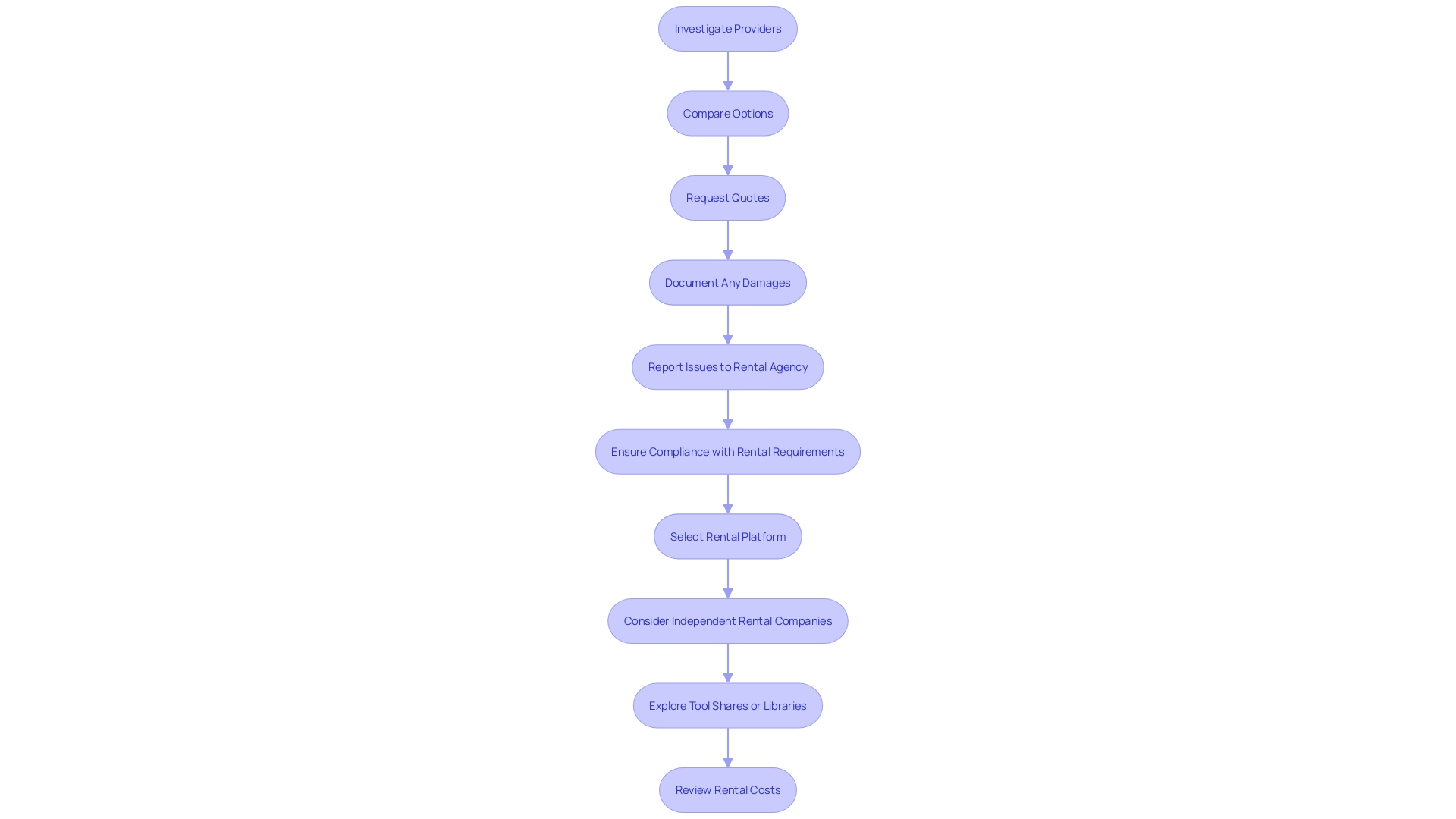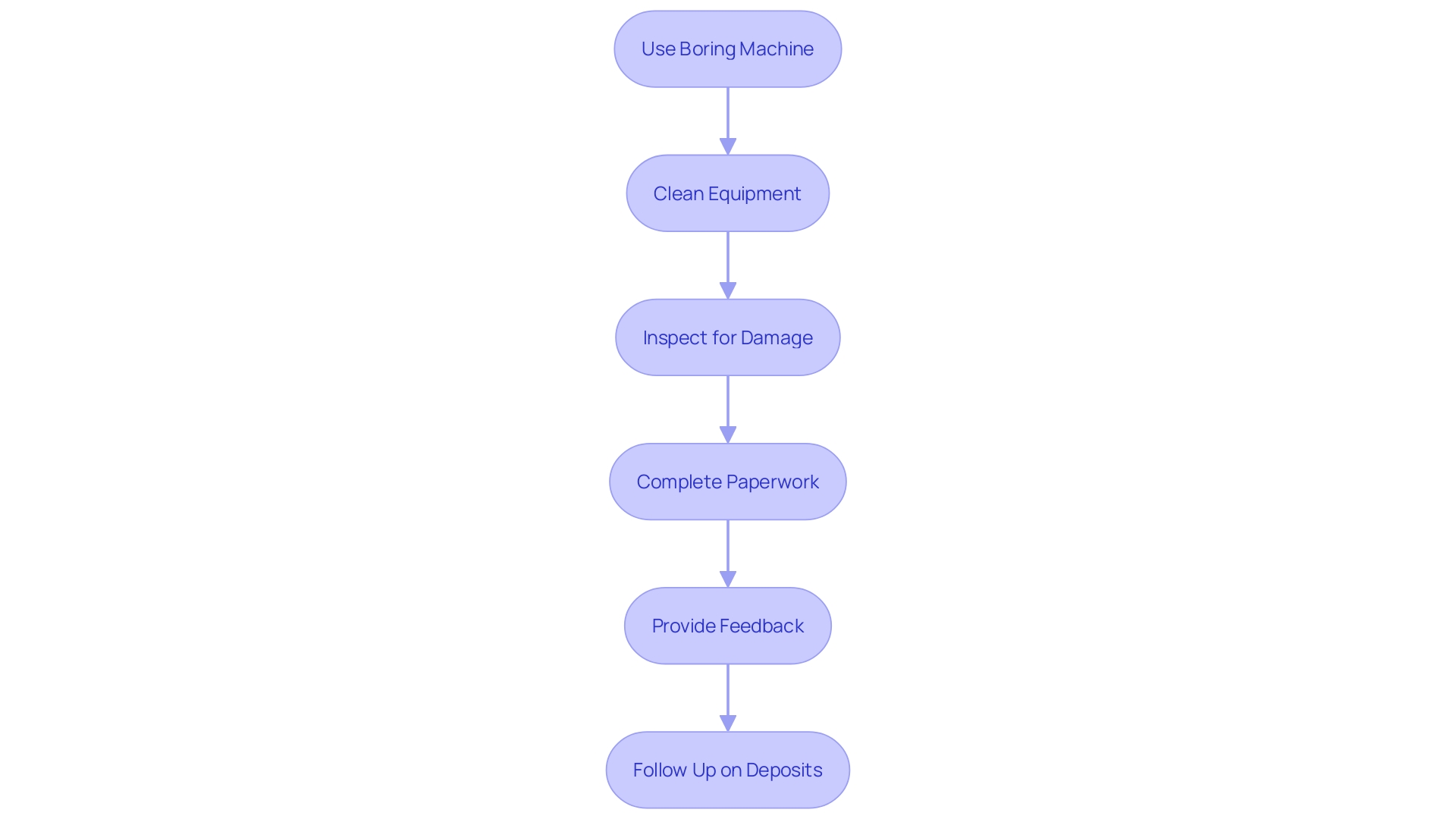Introduction
When embarking on a construction project that requires a boring machine, the path to success is paved with careful planning and informed decision-making. From understanding the specific needs of the project to navigating the rental process, there are numerous factors that can influence both efficiency and cost. With the right approach, even the most complex tasks can be executed smoothly, minimizing delays and maximizing productivity.
This article delves into essential considerations for renting a boring machine, offering a step-by-step guide to streamline the process and ensure compliance with local regulations. By addressing these key elements, project managers can enhance their operations and achieve outstanding results.
Key Considerations Before Renting a Boring Machine
When preparing to rent a boring machine for your project, it is crucial to evaluate several key factors that will influence your equipment selection and project success:
-
Project Scope: Clearly define your project’s specific requirements. Are you planning to bore for plumbing installations, electrical conduits, or landscaping features? Comprehending the exact range will assist you in choosing the appropriate size and kind of equipment required to fulfill your needs effectively.
-
Soil Conditions: Conduct a thorough assessment of the soil types prevalent in your project area. Various drilling devices are created to manage different soil types, such as clay, sandy soils, or rocky terrains. A soil test will provide valuable insights, ensuring you choose equipment that can operate effectively in the specific conditions you will encounter. For instance, a recent study showed that projects with diverse soil conditions saw a 15% increase in efficiency when the appropriate drilling equipment was utilized.
-
Rental Duration: Accurately estimate the period for which you will need the drilling equipment. Leasing companies typically have varied pricing structures based on the length of the lease period. By planning ahead, you can make cost-effective decisions that align with your project timeline. In 2024, the equipment leasing sector is expected to experience a 10% increase, indicating the rising need for effective project implementation.
-
Skill Level: Assess your own expertise and capability to operate the boring machine. If you lack experience, it may be prudent to hire a skilled operator, which could impact both your budget and the overall timeline of your project. Consider the training and support options available from leasing companies, which can enhance operational efficiency. For example, one construction firm reported a 20% reduction in project time by utilizing trained operators provided by their rental service.
-
Local Regulations: It is vital to check with local authorities regarding any permits or regulations related to drilling activities in your area. Ensuring compliance with these regulations will help you avoid potential fines and project delays, keeping your operations on track. A recent case study revealed that projects that adhered to local regulations experienced 30% fewer delays compared to those that did not.
By considering these factors alongside pertinent statistics and practical examples, you can make informed choices when renting a drilling device, ultimately aiding the success of your construction project.
Step-by-Step Guide to Renting a Boring Machine
To effectively rent a boring machine for your construction project, follow these detailed steps to navigate the process smoothly:
-
Investigate Equipment Providers: Start by locating local machinery leasing services that focus on construction equipment. Concentrate on those with a strong variety of dull equipment tailored for your particular project requirements. According to industry experts, comparing at least three rental companies can help you find the best deal and service.
-
Compare Equipment Options: Evaluate the different kinds of boring devices available for rent. Consider crucial specifications, including depth capability and power source options—such as gas or electric—tailored to your project's requirements. Recent trends indicate that electric machines are gaining popularity due to their lower environmental impact and operational costs.
-
Request Quotes: Reach out to several leasing companies to gather quotes. Make sure to inquire about leasing rates, deposit requirements, and any additional costs that may apply, such as insurance and delivery fees. A comparative analysis from 2024 indicates that average leasing costs for boring equipment vary from $300 to $800 daily, depending on the equipment type.
-
Check Availability: Confirm that the machine you need is accessible during your desired usage period. It's wise to book in advance, particularly during peak construction seasons when demand may be high.
-
Read the Lease Agreement: Before finalizing the lease, thoroughly review the lease agreement. Pay close attention to terms related to damage liability and maintenance responsibilities to avoid any misunderstandings later. As highlighted in case studies like the Zero Flare Campaign in Nigeria, clear agreements can prevent costly disputes.
-
Schedule Delivery or Pickup: Coordinate with the leasing service regarding the delivery of the equipment or plan to pick it up yourself. Ensure you have the appropriate vehicle and equipment for safe transport.
-
Receive Instruction: If you are not knowledgeable about the functioning of the drilling equipment, ask for a brief training session or consult the operational manual supplied by the leasing service. Familiarity with the equipment can significantly enhance safety and efficiency.
-
Inspect the Equipment: Prior to use, conduct a thorough inspection of the boring device for any pre-existing damage and verify that it is in proper working order. Report any issues to the leasing company promptly to prevent liability. Statistics show that thorough inspections can reduce equipment-related accidents by up to 30%.
-
Return the Equipment: At the end of your borrowing period, return the apparatus promptly to avoid incurring additional fees. Ensure it is clean and in the same condition as when you received it.
By adhering to these steps, you will reduce possible challenges and make knowledgeable choices when renting a drilling device, ultimately improving the effectiveness of your construction projects. Remember, taking the time to research and choose the right equipment rental company can save you both time and money in the long run.

Post-Rental Considerations
After using the boring machine, keep these considerations in mind:
- Clean the Equipment: Return the device in a [clean state](https://www.breezeway.io/blog/outsource-vacation-rental-cleaning) to avoid additional cleaning fees. Remove any dirt, debris, or materials from the machine.
- Inspect for Damage: Check for any damage that may have occurred during use. Record any problems and notify them to the leasing firm to prevent conflicts.
- Complete Any Required Paperwork: Ensure all leasing documentation is finalized and submitted according to the provider’s guidelines.
- Provide Feedback: If relevant, offer your input to the leasing service regarding your experience. This can help improve their services and inform future customers.
- Follow Up on Deposits: If a deposit was made, follow up with the rental company regarding the return of the deposit following the successful return of the equipment.


Post-Rental Considerations
After using the boring machine, keep these considerations in mind:
- Clean the Equipment: Return the device in a [clean state](https://www.breezeway.io/blog/outsource-vacation-rental-cleaning) to avoid additional cleaning fees. Remove any dirt, debris, or materials from the machine.
- Inspect for Damage: Check for any damage that may have occurred during use. Record any problems and notify them to the leasing firm to prevent conflicts.
- Complete Any Required Paperwork: Ensure all leasing documentation is finalized and submitted according to the provider’s guidelines.
- Provide Feedback: If relevant, offer your input to the leasing service regarding your experience. This can help improve their services and inform future customers.
- Follow Up on Deposits: If a deposit was made, follow up with the rental company regarding the return of the deposit following the successful return of the equipment.


Conclusion
Understanding the intricacies of renting a boring machine is vital for the success of any construction project. By evaluating key factors such as project scope, soil conditions, rental duration, skill levels, and local regulations, project managers can make informed choices that enhance efficiency and minimize costs. This thorough preparation not only streamlines the rental process but also sets the stage for a successful execution of the project.
The step-by-step guide to renting a boring machine further emphasizes the importance of careful planning. From researching rental companies to inspecting the equipment before use, each step plays a crucial role in ensuring that the right machine is selected and operated effectively. Following these guidelines can significantly reduce the potential for errors and delays, ultimately leading to a smoother project timeline.
Finally, post-rental considerations are equally important. Properly cleaning the equipment, inspecting it for damage, and providing feedback to the rental company contribute to a positive rental experience and can foster better relationships for future projects. By adhering to these practices, project managers not only safeguard their investments but also enhance their operational efficiency for subsequent endeavors.
In summary, a comprehensive approach to renting a boring machine—rooted in meticulous planning and adherence to best practices—can dramatically improve project outcomes. Embracing these strategies ensures that construction projects are executed with precision, paving the way for success in even the most complex tasks.




